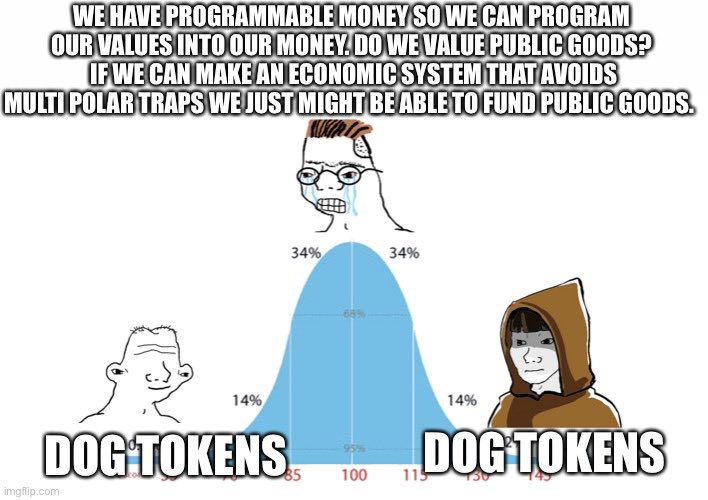Dog coins and reputation games
Krishang Nadgauda / May 13, 2021
3 min read
Though we have yet to figure out how reputation operates in the decentralized world, we've all come to learn one thing for certain — lessons about how reputation operates in our non-digital fiat life aren't easily transferable to permissionless protocols like Ethereum.
This makes reputation-in-crypto a red hot topic of study. People leverage their own or others' reputation, knowingly or unknowingly, with NFTs, EIPs, DAO proposals and in all kinds of other ways.
The most recent fascinating play on reputation lies at the intersection of dog coins, rugging and unplanned charity.
Dog coins like $SHIB and $AKITA tried to leverage reputation in a way that has now backfired (well, backfired for them).
These dog coins present themselves as decentralized meme tokens with a twist in their supply mechanics. These tokens launch with a fixed supply, and send 50% of it all to Vitalik. This act of airdropping 50% of the tokens to Vitalik is framed as "burning". That is because behind making Vitalik dog coin rich, in this way, is a bet.
There's a dark cloud hovering over every meme token; a shared understanding that it could all go to zero at any given moment. How it generally plays out is that a meme token enjoys a sub-dollar value until someone with the lion's share of the token begins to sell it all for that sub-dollar value, essentially ending the meme.
The dog coins in question attempted to leverage this knowledge. If the one with the lion's share of the token never dumped it, the meme would never end. Now, who — and for what reason — would avoid making a killing by selling the few trillion meme coins that were just handed over to them?
The Dog coiner thesis — send 50% of the dog coin supply to Vitalik. He's the founder of Ethereum and well acquainted with meme culture. He wouldn't want to rug a few people trying to have fun and build a community on Ethereum; it's a dog meme, nothing malicious, Vitalik surely "gets it". Plus, the dog coins have a non trivial market cap; rugging actual value from dog coiners is no joke. Vitalik won't rug the dog coiners for just a few hundred ETH because it would tarnish his reputation.
... or so was the idea.
Reputation is highly relational. An entity would generally want to maintain good reputation in relation to what and who it values or cares about. In the case of an individual, it's unclear whether even that very individual has complete access to facts about who and what they value or care about.
What cost the dog coiners their meme money is their misunderstanding of reputation. Firstly, in trusting that Vitalik wouldn't dump his share of the dog coins, the dog coiners made a bet about what and who Vitalik values — a fact that is revealed, to even Vitalik, only in retrospect. Secondly, they tried to apply lessons of how reputation operated in the non-digital fiat world, to the world of open, permissionless protocols.
